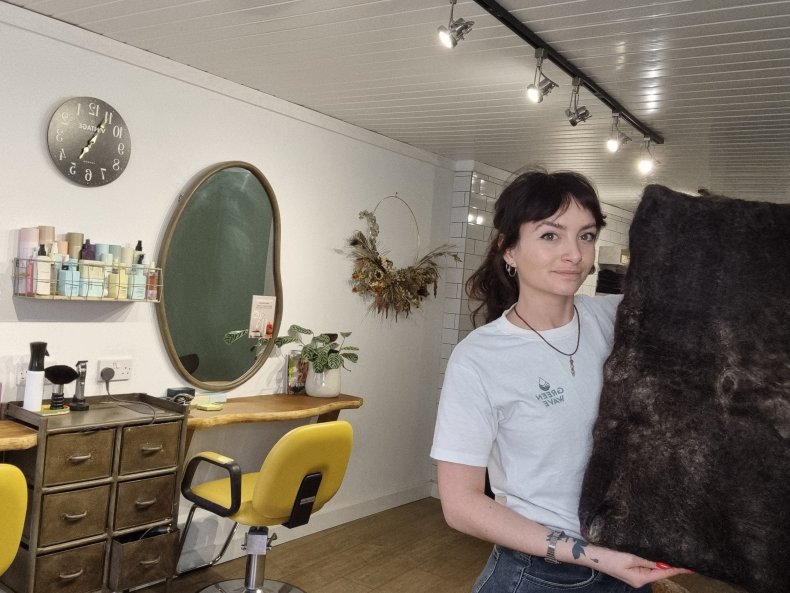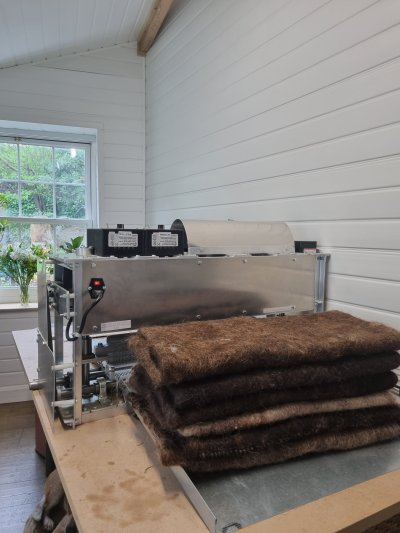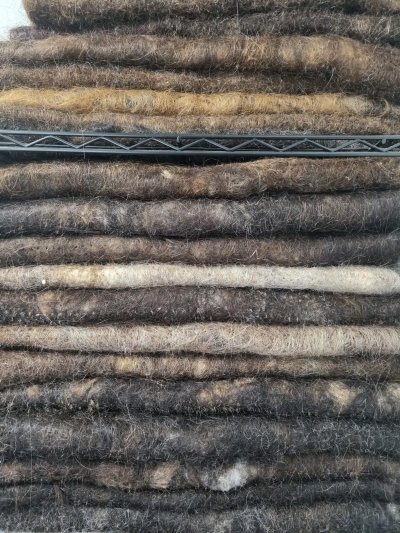I've been a hairdresser for about 10 years and I've worked all around the world. In March 2020, I moved from Canada back to Wales, where I'm originally from, and started up my own sustainability driven hair workshop.
When I was out in Canada I worked in a hair salon where they sent all their waste hair off to be recycled into mats. These mats were then used to absorb oil from the water when oil spills occurred. It really makes sense because hair naturally absorbs oil. That's why we shampoo our hair and it's why, as a hairdresser, I see many people with greasy and oily hair coming in to have their hair washed and cut.

So, I had the idea of setting up a service to allow hair salons in the U.K. to do the same, but I discovered that no one was making the mats here yet. Instead, oil spill mats made from polypropylene plastic are typically used.
I decided to look for a workshop space and get hold of a needle felting machine that makes the mats. Then, I started gathering hair.
I get sent hair from all over the place, and it's all human hair. It is amazing how much I receive. A lot of individuals donate to me; if they have a haircut they will send me an envelope of their hair. I'll get a package in the post and it'll be hair again, it is quite strange. But, if you think about the size of the population in the U.K. alone, and that many people are trying to recycle more, it makes sense. When people cut off a lot of hair they tend to search online where they can send it and they see me.
I also get big donations from hair extension companies, because they have a lot of off cuts. That hair is great because it's all washed and treated so it's really easy to bind together into mats. Sometimes I also get hair from household appliance companies, they might be testing new hot tools and will then send the segments of different hair textures they've been testing to me.



Hair salons send me hair too, but they have to sort through the hair and make sure they're not sending hair under one inch in length. Sometimes, they might sweep the whole floor and send me all the debris off the floor, too, which could break my machine and take a long time to sort through. But in that case, I compost any hair that's too short.
I think being a hairdresser means the thought of touching hair and heads doesn't creep me out as much as it might other people. And, most of the hair that is sent to me is washed and cleaned anyway. When I receive hair from individuals, I leave for three months in case there is anything in there. But I have never actually found anything unpleasant.
I made my first mat in November 2020, and I have now made about 100. They absorb at least four times their weight in oil. We have tested them in containers of water and motor oil, and once the oil is attached to the hair, you can keep dunking the mat in the water; the oil won't come out of the hair once it's in there. It will just keep attaching until the hair mat is fully saturated.
But it takes approximately 800g of hair to make one mat, which is actually quite a lot. A head of shoulder length hair, of average thickness, would probably weigh around 30g.
The machine I use has many needles that are sensitive to hair, so they weave the hair back and forth. I use longer hair on the outside of the mat, and then shorter hair from hair salons that's all matted together on the inside. I lay the longer hair onto a tray which then feeds through the machine and weaves all that together. That creates a thin piece of netting completely made of hair, I'll put that back through the machine and layer it with filling, which is the more matted hair. Then I fold a layer of longer woven hair on top of that and feed it back through the machine. It gets fed through the machine about 10 times before it's thick and condensed and not coming apart.
That process takes about two hours, but with two people it can be about 45 minutes. So my goal now is to set this part of my business up as a social enterprise and get funding to get a big unit or factory so we can be making these mats on a bigger scale and become the first response for oil spills around the U.K.
I probably should keep track of how much hair I have. On top of the 80kg of hair mats I have already made, I know I have about seven additional boxes of hair, each weighing 25kg, so that's another 175kg.
In Canada, I remember seeing that this was happening and thinking: Wow, why aren't we doing this in the U.K? Then, during lockdown in the U.K. I decided to make these mats a "thing" here and I've just kept going with that really.
I'm inspired by making the world better. It's amazing to me that we have this material growing out of the top of our heads that could solve a lot of issues, but we're producing plastic mats, out of oil, to clean up oil. It seems so wrong. This material on our heads is just getting thrown in the bin, but it's more effective and it's not harmful to the environment. So, I've become quite passionate about it.
Adele Williams is the founder of Green Wave Hair Workshop and salon in Pembrokeshire, U.K. You can follow on Instagram @greenwavehairworkshop.
All views expressed in this article are the author's own.
As told to Jenny Haward.
Bagikan Berita Ini

















0 Response to "'I Collect Human Hair' - Newsweek"
Post a Comment